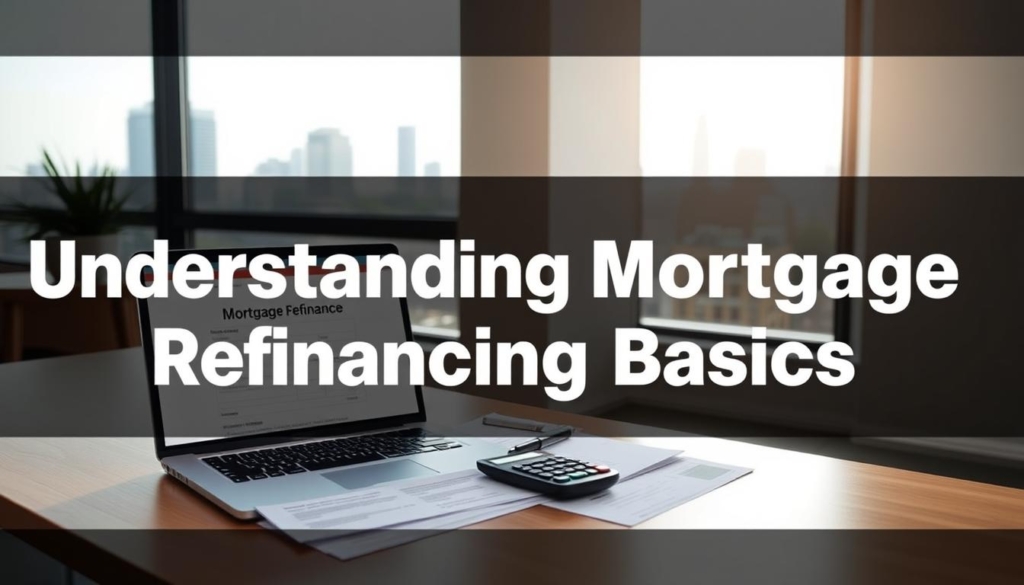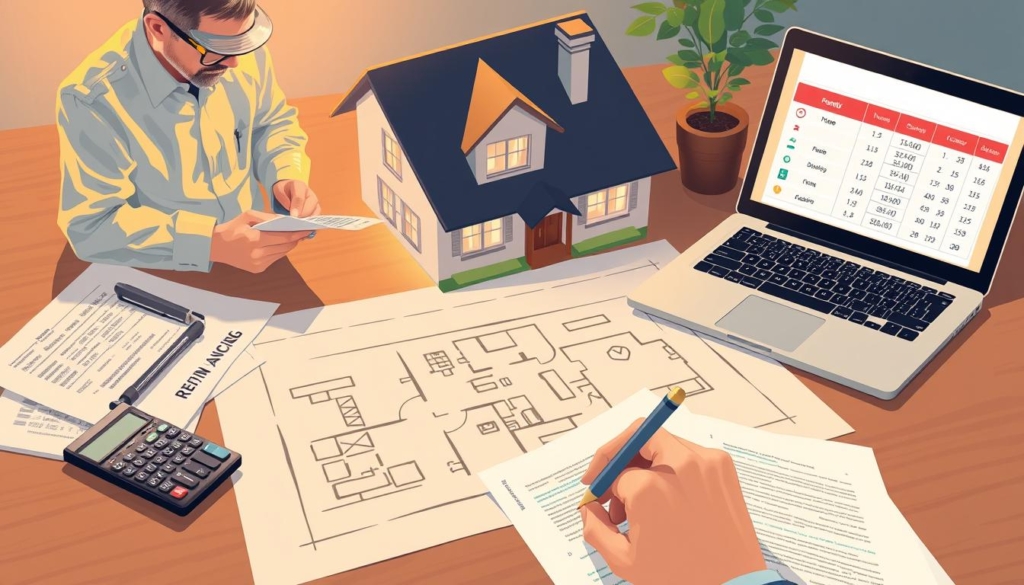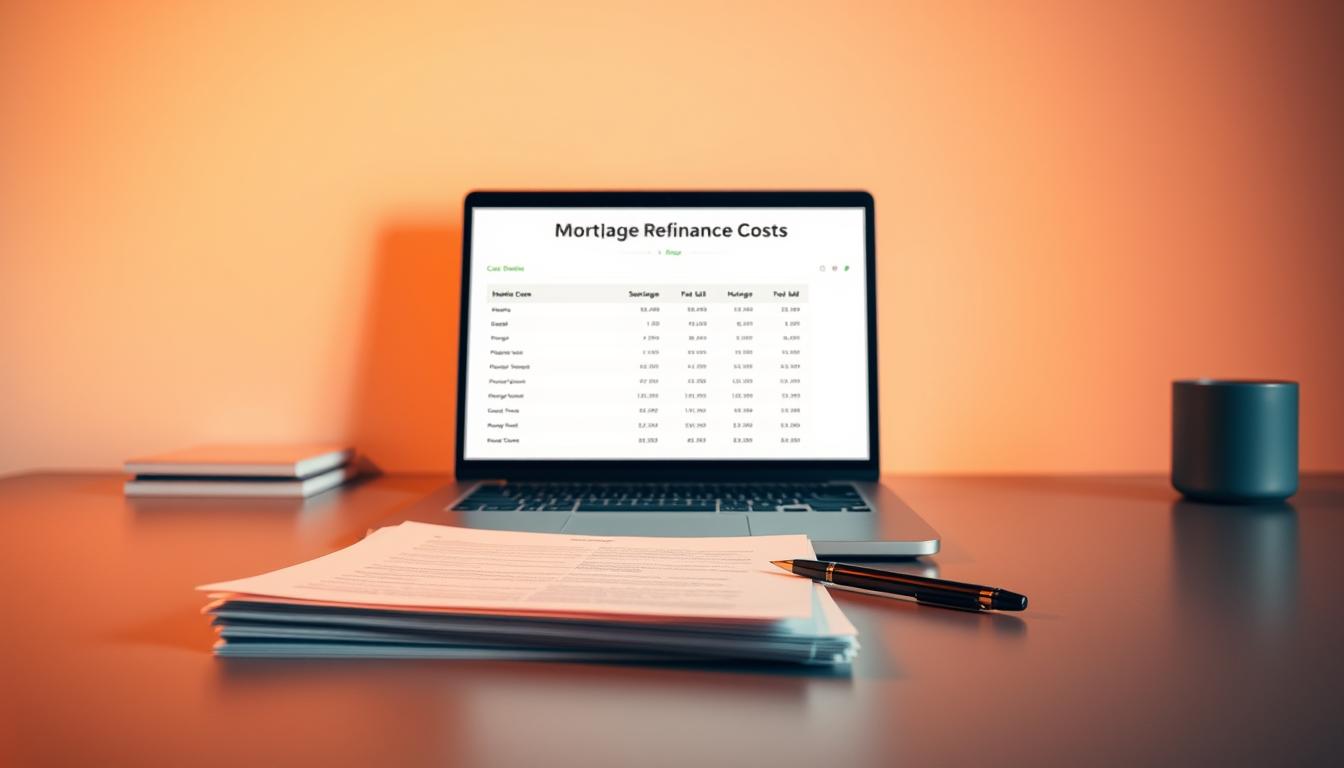Refinancing a mortgage can be a smart move for homeowners in Canada. New Homes Alberta knows it’s key to understand the costs of refinancing. This helps homeowners make better choices about their home loans.
The cost to refinance a mortgage can vary a lot. It usually falls between $2,500 and $3,000. Homeowners need to get ready for several expenses that affect the refinancing process.
When refinancing, it’s important to think about different fees and penalties. You also need to consider the long-term benefits. Costs include legal fees, appraisal expenses, and possible prepayment penalties. These are all things homeowners should think about when deciding to refinance.
Key Takeaways
- Average refinancing costs can exceed $2,500
- Prepayment penalties vary by mortgage type
- Total refinancing expenses may range from $3,000 to $9,000
- Home appraisal fees typically cost $300 to $600
- Legal fees for refinancing range from $750 to $1,250
- Potential for significant long-term interest savings
- Mortgage stress tests apply to all refinancing options
Understanding Mortgage Refinancing Basics
Mortgage refinancing is a smart move for homeowners. It lets you change your loan terms for better financial health. By refinancing, you swap your current mortgage for a new one with different terms.

Refinancing can greatly benefit homeowners. Knowing the requirements and what’s possible is key to making a good choice.
What is Mortgage Refinancing?
Refinancing means paying off your current mortgage with a new one. This new loan might have:
- A different interest rate
- Adjusted loan term
- Modified payment structure
- Potential cash-out option
Key Benefits of Refinancing
Refinancing offers many advantages:
- Lower Interest Rates: Lower your monthly payments with a better rate
- Debt Consolidation: Roll high-interest debts into one easy payment
- Access Home Equity: Use your home’s value for big expenses
- Change Loan Type: Switch between fixed and variable rates
When to Consider Refinancing
Deciding to refinance depends on several factors. You might want to refinance if:
- Current interest rates are at least 1 percentage point lower than your mortgage
- Your credit score has improved a lot
- You want to lower your monthly payments
- You plan to stay in your home for a few more years
The refinancing process usually takes 15 to 45 days. Closing costs can be 2% to 5% of the loan amount. You’ll need a credit score of 620 or higher for a conventional refinance.
How Much Does It Cost to Refinance a Mortgage
Refinancing a mortgage comes with several costs to consider. Knowing the costs is key to making a smart choice. Closing costs usually fall between 2% to 6% of your mortgage balance left.
Several factors can affect the total cost. Here’s a list of possible expenses:
- Application fees: $75 to $500
- Appraisal fees: $300 to $1,000
- Underwriting fees: $300 to $900
- Credit report fees: $10 to $100 per borrower
- Title services fees: $300 to $2,000
- Legal fees: $500 to $1,000
When figuring out refinancing costs, think about both upfront and long-term effects. For example, if refinancing saves you $200 a month and costs $5,000, it would take about 25 months to break even.
“Careful planning and understanding of refinancing costs can help you make a financially sound decision.”
Lenders often look for borrowers with a debt-to-income ratio under 43% and a FICO® Score of 620 or higher. Better credit scores can lead to better refinancing deals and lower costs.
In Canada, refinancing costs usually range from $1,000 to $3,000 or more. This investment might be worth it if you get a lower interest rate or improve your finances.
Breaking Down Refinancing Fees and Charges
Refinancing a mortgage means looking at many financial details. Knowing the fees and charges helps homeowners make smart choices about their mortgage.
Refinancing fees can add up fast. It’s key to understand the costs involved. Closing costs for refinancing include several important parts that homeowners should look at closely.
Legal and Administrative Fees
Refinancing brings legal and administrative costs. These include:
- Title search fees
- Document preparation costs
- Registration expenses
- Legal consultation charges
Appraisal and Assessment Costs
Lenders need a home valuation to know its worth. These costs are vital for refinancing.
| Assessment Type | Typical Cost Range | Purpose |
|---|---|---|
| Professional Home Appraisal | $300 – $600 | Determine current market value |
| Property Inspection | $200 – $500 | Assess property condition |
| Land Survey | $400 – $800 | Verify property boundaries |
Lender-Specific Charges
Each lender has its own fees for refinancing. Homeowners should compare these charges to lower their mortgage refinance fees.
Tip: Always ask for a detailed breakdown of closing costs from lenders to make a good choice.
Refinancing can be tricky, but knowing the fees helps homeowners manage the process better. This can lead to saving money over time.
Prepayment Penalties Explained
Understanding prepayment penalties is key when refinancing your mortgage. These penalties happen when you end your mortgage early. Knowing about them helps you make smart choices about refinance loan rates.
Prepayment penalties depend on your mortgage type:
- Variable-rate mortgages charge three months’ interest on the prepaid amount
- Fixed-rate mortgages use the interest rate differential (IRD) for penalties
- The penalty is the higher of three months’ interest or the IRD
When using a refinance calculator, think about prepayment penalties. For instance, on a $400,000 mortgage, penalties could be $1,500 to $16,800. This depends on your situation.
Prepayment penalties can greatly affect the cost of refinancing your mortgage.
Most lenders let you make partial payments without penalties:
- You can usually pay 10% to 20% of the original principal each year
- Paying more than this triggers penalty charges
- Open mortgages give you more freedom with prepayments
Pro tip: Always calculate the total cost, including penalties, before refinancing. This helps you see if it’s right for you.
Understanding Mortgage Registration and Discharge Fees
Understanding mortgage refinance fees can be tricky for homeowners. When looking at refinance loan rates, knowing about registration and discharge fees is key. These fees are often missed but can really add up.
Mortgage registration and discharge fees are important. They protect both lenders and borrowers. They make sure legal documents are handled right when property ownership changes.
Registration Process Insights
When you refinance your mortgage, lenders have to remove the old mortgage from your title. Then, they add a new one. This involves several steps:
- Getting the latest property documents
- Doing title searches
- Registering the new mortgage details
- Updating the provincial land registry
Discharge Fee Calculations
Discharge fees can change a lot, depending on where you are and who your lender is. Here’s what you might expect to pay:
- Mortgage discharge fee range: $250 to $400
- Mortgage registration fee: $50 to $150
- Fees vary based on lender policies and local rules
Remember, discharge fees are needed whether you’re staying with your current lender or switching. These fees pay for the work of officially releasing the lender’s claim on your property.
Pro tip: Always ask for a detailed list of all fees from your lender before you finalize the refinance.
Knowing about these costs helps you make better choices about refinance loan rates and how much you might save during the refinancing process.
Home Appraisal Costs in Refinancing

Homeowners need to know about home appraisals when refinancing. These evaluations help figure out your property’s current value. They are key in the refinancing process and affect closing costs.
Appraisal costs vary, usually between $300 and $500 for single-family homes. Several factors can change this price:
- Property size and complexity
- Location of the home
- Detailed inspection requirements
- Local real estate market conditions
The appraisal is vital for lenders to check risk and decide if you can get a loan. In 30-60 minutes, appraisers look at:
- Home’s overall condition
- Recent property improvements
- Comparable local property values
- Structural integrity
Important note: Homeowners pay the appraisal fee, even if they don’t refinance. Some lenders might waive this fee, but they might charge higher interest rates.
The appraisal protects both the borrower and the lender by ensuring the loan amount accurately reflects the property’s true market value.
Knowing about these costs helps homeowners make smart choices about refinancing.
Legal Fees and Professional Services
Refinancing your mortgage involves a lot of legal work. Legal fees are a big part of the costs. They cover important services that help protect your money.

Refinancing your mortgage means you’ll need a real estate lawyer. They handle key parts of the deal. These fees help keep your financial interests safe.
Attorney Fees Breakdown
- Comprehensive contract review
- Mortgage registration
- Title search verification
- Legal documentation preparation
Legal fees for refinancing usually cost between $800 to $1,200. The exact price depends on how complex your situation is.
Detailed Title Search Expenses
A detailed title search is vital. It checks if there are any liens on your property. It looks into who owns the property and if there are any legal issues.
| Service | Estimated Cost |
|---|---|
| Basic Legal Fees | $900 + Tax |
| Fixed Disbursements | $450 + HST |
| Wire Charges | $70 |
| Law Society Levy | $73.45 |
Getting professional legal help makes refinancing smoother. It protects your investment and gives you peace of mind.
Variable vs Fixed Rate Refinancing Costs
Homeowners have to choose between variable and fixed-rate mortgages when refinancing. Knowing the costs of each option is key to your financial future.
Refinance interest rates show big differences between variable and fixed-rate mortgages. Here’s what the stats say:
- Approximately 60% of clients choose a 5-year fixed-rate mortgage
- Around 30% opt for a 5-year variable-rate mortgage
- Typical rate difference ranges from 0.25% to 1%
Penalties for breaking the mortgage show the financial risks:
| Mortgage Type | Penalty Calculation | Average Cost |
|---|---|---|
| Variable Rate | 3 months’ interest | Lower penalty |
| Fixed Rate | Greater of 3 months’ interest or Interest Rate Differential | Higher penalty |
A CIBC study found variable-rate mortgages are better for 88% of borrowers. Potential savings over five years can reach $5,464. This makes it a good choice for those who can handle risk.
Market conditions are important when deciding to refinance. Switching between variable and fixed rates can be smart during economic changes.
Calculating Break-Even Point for Refinancing
Refinancing your home needs careful thought. A refinance calculator is key for making smart mortgage choices.
Finding the break-even point is vital. It shows when refinancing will start saving you money. Let’s look at how to figure out this financial milestone.
Cost-Benefit Analysis Fundamentals
Refinancing your mortgage requires detailed financial planning. Costs can range from $5,000 to $9,000, based on your loan amount. Here are the main points to consider:
- Total refinancing costs: 2% to 6% of outstanding principal
- Potential monthly savings: Typically $200 per month
- Break-even timeline: Usually 21-25 months
Long-Term Savings
A good refinance calculator can show your savings over time. Think about these examples:
| Refinance Scenario | Monthly Savings | Total Interest Savings |
|---|---|---|
| 30-year to 15-year term | $85.43 | $63,818 |
| 5% to 3.25% APR | $61.25 | $68,169 |
To get the most from refinancing, think about your long-term plans. If you stay in your home past the break-even point, you’ll save more.
Pro tip: Use a refinance calculator to model different scenarios and understand your savings.
Consider current interest rates, your loan term, and how long you’ll stay in your home. A smart refinance can save you a lot of money over time.
Refinancing with Current vs New Lender

Deciding between your current lender and a new one for refinancing is a big choice. It can greatly affect your interest rates and financial plans.
Homeowners should think about several important things when choosing:
- Potential interest rate differences
- Switching costs and fees
- Existing relationship with current lender
- Loan-to-value ratio requirements
Going with your current lender can be easier. They might offer better terms because of your history and relationship.
Choosing a new lender has its perks. Some lenders give great deals to new customers, like:
- Cash-back offers up to $500
- Potential coverage of legal fees
- Competitive refinance interest rates
| Refinancing Option | Potential Benefits | Possible Challenges |
|---|---|---|
| Current Lender | Easier approval process | Limited rate flexibility |
| New Lender | Competitive rates | Additional switching fees |
Pro tip: Always compare offers from multiple lenders. Think about the total cost of refinancing, not just the interest rate.
Also, remember the loan-to-value ratio in Canada is 80%. You need at least 20% equity to refinance.
Government Programs and Refinancing Options
Refinancing your mortgage can seem tough, but Canadian homeowners have help. The government offers special programs to make refinancing easier. These programs help homeowners get the most out of their homes and tackle high housing costs.

The Canadian government has created new refinancing options. Starting January 15, 2025, a new Secondary Suite Refinance Program will open doors for homeowners. It lets them explore new financial paths.
Key Refinancing Program Highlights
- Maximum loan-to-value (LTV) ratio of 90% for property refinancing
- Property value cap of $2 million
- Maximum amortization period of 30 years
- Ability to add up to four units on existing property
Refinance Requirements and Eligibility
To get into these refinancing options, homeowners need to meet certain criteria. Secondary suites must be:
- Fully self-contained units
- Compliant with municipal zoning regulations
- Designated for long-term rentals
- Not used for short-term rental purposes
| Program Feature | Details |
|---|---|
| Loan Amount | Up to $80,000 |
| Loan Term | 15 years |
| Interest Rate | 2% |
| Recommended Equity | 35% |
These refinancing programs are a smart way to tackle housing shortages. They also give homeowners a chance to earn more and make the most of their property.
Cash-Out Refinance Costs
A cash-out refinance lets homeowners use their home’s equity for financial freedom. It’s a way to borrow against your home’s value and get cash. This can be very useful.
Thinking about the costs of a cash-out refinance? Several important factors come into play. Homeowners can borrow up to 80% of their home’s value. This can be a big financial help.
- Maximum borrowing: 80% of home’s value
- Closing costs: Can be thousands of dollars
- Processing time: Takes about 45-60 days
The process of a cash-out refinance involves getting a new, bigger loan. You then get the difference in cash. For example, if you have a $300,000 home, you could refinance a $100,000 mortgage into a $240,000 loan. This would give you $140,000 in cash.
When considering cash-out refinancing, keep these points in mind:
- Interest rates are often higher than regular refinancing
- It can affect your credit score
- Missing payments can lead to foreclosure risk
To get the best terms, keep your credit score high and your loan-to-value ratio low. Using cash-out refinancing wisely can help pay off high-interest debt or fund big investments.
Ways to Reduce Refinancing Costs

Dealing with mortgage refinance fees can be tough. But, with the right strategies, homeowners can cut down on costs. It’s all about planning and making smart financial choices.
Using the right methods can greatly reduce your mortgage refinance fees. This way, you can get more out of refinancing. Here are some effective ways to do it:
- Improve your credit score before applying
- Shop around for competitive lender rates
- Negotiate closing costs with lenders
- Explore blend and extend mortgage options
- Time your refinance to avoid penalties
The blend and extend method is a smart choice. It lets you refinance without usual penalties. This can save you thousands in fees.
Improving your credit score is key. Lenders need scores between 500 and 650 for refinancing. A better score means better rates and lower costs.
Strategic refinancing isn’t just about lowering monthly payments—it’s about minimizing long-term financial impact.
When looking at refinance benefits, calculate your break-even point well. Refinancing costs can be from $1,200 to thousands. This includes legal fees, appraisals, and registration costs.
Homeowners should have at least 20% equity. They should also be ready for short-term credit score drops during refinancing.
Conclusion
Knowing the cost to refinance a mortgage is key for homeowners looking to improve their finances. The process can cost between 2% to 6% of the loan’s value. For a $300,000 mortgage, this could mean up to $18,000 in closing costs. It’s important to weigh these costs against the benefits before deciding.
When looking into refinancing, several factors come into play. Your credit score is a big deal, with scores over 740 getting you better rates. In 2020, the average refinance cost was about $5,000. But, the long-term savings can make up for these costs.
New Homes Alberta is here to help you understand mortgage refinancing. Our experts can help you see the savings and guide you through the process. If you’re thinking about refinancing, call our team at (403) 305-9167. We’re here to help you make the best choice for your financial future.





